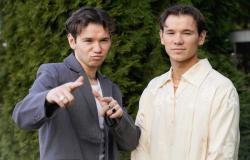– If NTNU is a schooner, then it’s cracking in the frames now. The deans at one faculty after another are sharpening their scythes. The number of institutes must decrease. The number of man-years must be reduced. None of you will promise that there will be no need for redundancies. So where are we going, asked editor Tore Oksholen in his introduction to the third principal’s debate.
On Tuesday evening, UA’s third and final chancellor candidate debate was held in the Lille hall in Olavshallen. The first debate out was NTNU vs. the students, since NTNU vs. the world – tonight it was NTNU vs. the employees.
manager
New chancellor debate: NTNU is struggling to open up the process
Present were the three internal rector candidates, acting rector Tor Grande, dean Monica Rolfsen and dean Øyvind Gregersen. Together with Professor Jan Gulliksen at the Swedish university KTH, they are still candidates for the rector’s job at NTNU.
– NTNU is organized in such a bad way
After Oksholen had introduced, he gave the floor to professor and member of the NTNU board, Aksel Tjora. Tjora was invited to challenge the three headmaster candidates.
It is not the first time Tjora has challenged managers. This evening, too, he made sure to put the candidates to bed.
– I’m going to interrupt you when there’s nothing but sleet, said Tjora, who also kept that promise several times during the debate.
You can watch the entire debate recorded here.
In addition, Nora Kulset, head of the Department of Music at NTNU, was invited as a challenger. Due to time constraints as head of department at the university, Kulset had to cancel on the same day.
“NTNU is organized in such a bad way that I, with my 180 employees for whom I have direct personnel responsibility, do not have time to come anyway since I am currently alone from NTNU working together with the Church Council, the trade union and the rector of the School of Music, so that there will still be church music education in the church capital Trondheim. Do the chancellor candidates think NTNU is organized in the right way?
You can manage just fine without me, I’ll soon hit the wall here.”, said the email Kulset sent to editor Oksholen, which was read out during the debate.
Read more about the church music issue here.
Got the number of searchers increased, but now they are not allowed to record anyone
– It is one of us who works, and it is not the dean
It was also the entrance to the first point. What is it like to sit at the urias post as head of department? Do the rector candidates have anything more to give them than a pat on the back and good luck with the cuts?
– It is important that we don’t just cut with a cheese grater and leave it up to the insight manager what to cut now that there are worse economic times. Then they are left with the responsibility. We have to go through and remove concrete tasks when there is less money. At least that makes it easier, replied Øyvind Gregersen.
It was Monica Rolfsen who was next out. She is married to Karl Erik Haug, who is himself head of department at the Department of Modern Social History.
– When he is in his most infamous corner, he usually says that it is one of the two of us who is actually working, and it is not the dean, she stated.
– It is clear that it is a position where you have responsibility for both big and small things. It is the job that is the toughest in many ways. Then it is important that we are better at allocating resources so that they have the opportunity to actually do that job, Rolfsen continued.
In the end it was up to Grande, who even now has been at NTNU’s highest management level, level one, for almost four years. He was asked whether he has done enough for those down on the third management level.
– We certainly don’t have that. I’ve also been in that job, all three of us standing here have, and know what it’s like with everything that comes in from the side. It is important with level four and how we can share those tasks. But especially now, I think it is true that head of department is one of, if not the most important, job done at the university, Grande stated.
– My hypothesis is that there is no money to move Dragvoll
When you first looked at the finances, there was of course no doubt that Tjora was going to take up the campus project. The professor at the Department of Sociology and Political Science has been one of the clearest voices against moving the Dragvoll communities down to Gløshaugen.
Five deans on why NTNU’s board should go for a unified campus
– I have tried to challenge at the board meetings how we are going to manage this here, when we have approximately one billion that we have to self-finance, but the money is not there. Is the campus gathering realistic at all? My hypothesis is that a lot of work is being done at Gløshaugen, but that there is no money to move Dragvoll, said Tjora.
Acting principal Grande was the first to comment on Tjora’s hypothesis.
– It is important that we look at this critically. But first of all I want to say that this is happening now. Money has been allocated from the Storting, so the gathering will become a reality. Now the premise of your question is based on the fact that we are unable to keep control of the economy. I think we can do that, said Grande, which sparked some disagreement from Tjora about whether NTNU is good at keeping control of its costs at the moment.
Dean Rolfsen was the next to comment.
– If we fail to move Dragvoll, then we are in serious trouble. That is the premise of the entire project. I am quite positive. It does not appear that there are any major unforeseen consequences, said Rolfsen.
– Yes, because Statsbygg has not had overruns before, Tjora said with obvious irony in reference to a number of cases UA has discussed about overruns by the state contractor.
– Now it’s only them who are project owners. There are a number of other contractors who will be responsible for the actual construction here. Among other things, Veidekke in the first part of the project, Rolfsen specified.
Gregersen also expressed calm about the fact that the project is actually happening.
– Yes, we will be able to move Dragvoll. I have faith in that. But it is clear, we are dependent on there not being large excesses, he stated.
This contractor will start the campus project
Make NTNU NTH again?
The next item on Tjora’s program was the dimensioning committee, which has looked at which studies NTNU will pursue over time. Tjora expressed concern that several subjects may be closed and whether NTNU will continue to be a broad university in the long term.
– Now the focus will be on the profile with technical and natural science subjects. What we see is, in a 15-16-year perspective, that NTNU has again become NTH, isn’t that right, asked Tjora.
He received a solid no to that from all three candidates.
– There are some of the studies that have too few students that we do not have the opportunity to maintain. This is somewhat market driven. Where we do not fill the places, we cannot afford to have it. We can rather look at new opportunities where we can make interdisciplinary combinations, such as language and technology, suggested Rolfsen.
– Yes, that we get, for example, an interdisciplinary master’s in health management, said Tjora in reference to the much-discussed master’s of Ingvild Kjerkol.
– Or to use an example from your own institute which is a huge success: master’s in organisation, digitalisation, administration and work. It is in the top ten on the most sought-after master’s programme, said Rolfsen.
Move Dragvoll to UiO?
– I once suggested in Universitetsavisa that the Faculty of Humanities and the Faculty of Social and Educational Sciences could be linked to the University of Oslo. That would solve a number of problems, because there is an asymmetry between the Gløs subjects and the Dragvoll subjects that you don’t see at other universities, Tjora stated.
Surprised by findings that show a deep cultural conflict
He suggested that the class distinction between the various subjects will be shown very clearly when poor line associations from Dragvoll will be side by side with rich line associations at Gløshaugen.
– I do not agree with the premise you put forward there, Grande asserted, before he and Tjora ended up in a rather heated exchange about whether this class distinction is to be regarded as an established fact.
– In any case, it is clear that NTNU will continue to be a broad university. That doesn’t mean there aren’t biases that can be addressed. I think we can do that over time. This also has to do with working life, and we have been keen for them to realize that, said Grande.
– We have to teach fewer subjects
A question then with all this is what NTNU should concretely do less of. One person who had clear thoughts there was Gregersen.
– One thing is to teach fewer subjects. We have to look at how much eligibility we have, and some master’s programs must have less of that. We also have some overlap between different subjects. If we don’t reduce the teaching time, it will go beyond the research time, we can’t afford that, he stated.
Rolfsen also had a concrete idea of what could be done less of.
– We do not have to respond to all hearings. It takes an awful lot of time. I think that by carpooling across the university we can save quite a bit there.
NTNU may have to cut the study offer: – It is important that we not only keep the most popular studies
Grande also made a third suggestion, in addition to agreeing with the others.
– We tend to hire many more academic staff than administrative staff. This means that some responsibility is transferred to scientists, we must do something about that over time, he stated.
Should NTNU stop being submissive?
A question that came in from the viewers had the wording “Are you willing to break with NTNU’s tradition of acting in public subservience to ministries and ministers”?
The first man out was the one who sits in the management of the allegedly subservient university, Tor Grande.
– I do not accept the premise of that question. I think we have not acted submissively. Nor will we do that in the future. Some believe that we act submissively when we are actually responsible, he stated.
The next man was Gregersen.
– I believe that NTNU’s rector should raise his voice. At the same time, you can be a bit tactical when doing it. For example, it may be worth asking yourself whether it is best to fight in the media, or directly with the ministry.
Rolfsen was number three.
– NTNU is Norway’s largest and most important university. We can’t act submissive, she stated, succinctly.
Tjora summarized
When asked by Oksholen to summarize the debate, Tjora was direct, but somewhat positive.
– I had expected that there would be a lot of diffuse answers, and there were. But especially on what we should do less of, I think it was concrete and good, he said.
Finally, he made a call to whoever would win the battle for the rector’s throne.
– Stay close to those of us who work with teaching and research. Stay close to us at institute level. We have not experienced that from previous principals. I hope that the rector of the future is closer to the university’s core tasks, he stated.
Tags: Stay close institute level experienced previous principals
-





